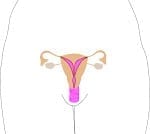This is a very frequent question in couples who are looking for a child and see the days go by and the pregnancy does not arrive.
The probability of pregnancy for a couple under 35 years of age, without any pathology, in a month is only 20%. For this reason, it can take several months for a couple to get pregnant. However, after 12 months, 80% of couples are already pregnant.
If this time has passed and pregnancy does not occur, there may be a problem. So the first recommendation is that if 12 months have passed since you have been trying to get pregnant and it does not arrive, it is time to consult a specialist.
An exception is when the woman is over 35 years old. This is because women are born with a defined number of eggs in their ovaries. In practical terms, no new eggs are produced after birth and on the contrary, from the very moment of birth, the woman begins to lose eggs. There comes a time when the eggs run out. This usually occurs at the age of 50, but from the age of 32-34 the ovarian reserve begins to be low, affecting fertility in women and the probability of monthly pregnancy, which falls to 18% per month at 35 years of age and 12% at 40 years of age. So a woman over 35 years of age already has the biological clock ticking against her and it is advisable to consult earlier, when only 6 months have passed without achieving pregnancy.
Other situations that require professional help even before 12 months:
- Irregular menstrual cycles. Irregular menstrual cycles usually reflect problems with the functioning of the ovary and therefore problems conceiving.
- Painful periods. Some discomfort during menstruation may be normal. Very bad pain can be caused by endometriosis or pelvic inflammation. These two conditions make it difficult to achieve pregnancy and should be studied.
- When there has been a history of surgery in the lower abdomen such as appendicitis, ovarian cyst surgery or fibroids. After these surgeries, pelvic adhesions can
form that prevent the normal functioning of the reproductive system. - When the man has a history of surgery on the testicles (undescended testicle, torsion) or trauma or blows.
- Changes in the color or smell of semen or pain in the testicles or duct during ejaculation. For men, these can be symptoms of inflammation that make it difficult to obtain a pregnancy.
- When there are difficulties with sexuality.

